Legal operations: everything you need to know

Legal teams are swamped with work. The 2021 EY Law Survey states that 76% of law departments find it challenging to manage current workloads.
That’s where legal operations comes in handy, helping the legal department to do more with less, by optimising and making legal more efficient.
A lot of businesses have recently jumped on the bandwagon and established a legal ops function. Numbers speak for themselves:
- More than six out of ten legal departments hired at least one legal operations professional in 2021
- Corporate Legal Operations Consortium’s 2021 State of the Industry report says that 40% of respondents have increased the number of full-time legal operations professionals
- 80% of legal departments asked indicated that they have at least one legal operations professional in Reuters’ Legal Department Operations Index
Whether you are looking to establish a legal ops function or planning to scale one, this guide is your go-to source. In this piece, you’ll find everything you need to know about the topic today.
We will cover:
- What is legal operations?
- Legal operations roles and responsibilities
- Why you must digitalise your legal department
- Legal operations technology
- How to build the legal function in a scaleup
What is legal operations?
Legal operations is a function that supports, enables, and optimises the in-house legal department. They plan legal functions, boost tech innovation, and bring value to the entire organisation.
This is how our CEO, Nils-Erik Jansson defines legal ops 👇🏼
If you boil down legal operations in one word, I would say it’s efficiency.
Our Legal Engineer & Compliance Manager, Jenny Hall, adds 👇🏼
To me, legal operations is everything that is not “standard” legal work like the actual contracting or negotiating.
Legal operations roles & responsibilities
No two legal operations teams are alike. Depending on the industry, company growth rate and many other factors, legal ops roles can be defined differently.
Yet, a common way to structure your legal ops team is according to the following breakdown.
Legal counsel function:
- Reviewing & negotiating contracts
- Creating contract templates
- Conducting legal research
- Providing any kind of legal advice
Legal operations function:
- Responsible for contract management
- Enabling legal & compliance reporting
- In charge of legal & compliance project management
- Providing any kind of legal & compliance training
The Corporate Legal Operations Consortium (CLOC®) surveyed more than 200 organisations and revealed some of the most common titles a legal ops leader may have. These include Legal Operations Director (27%), Legal Operations Manager (23%), and Head of Legal Operations (9%).
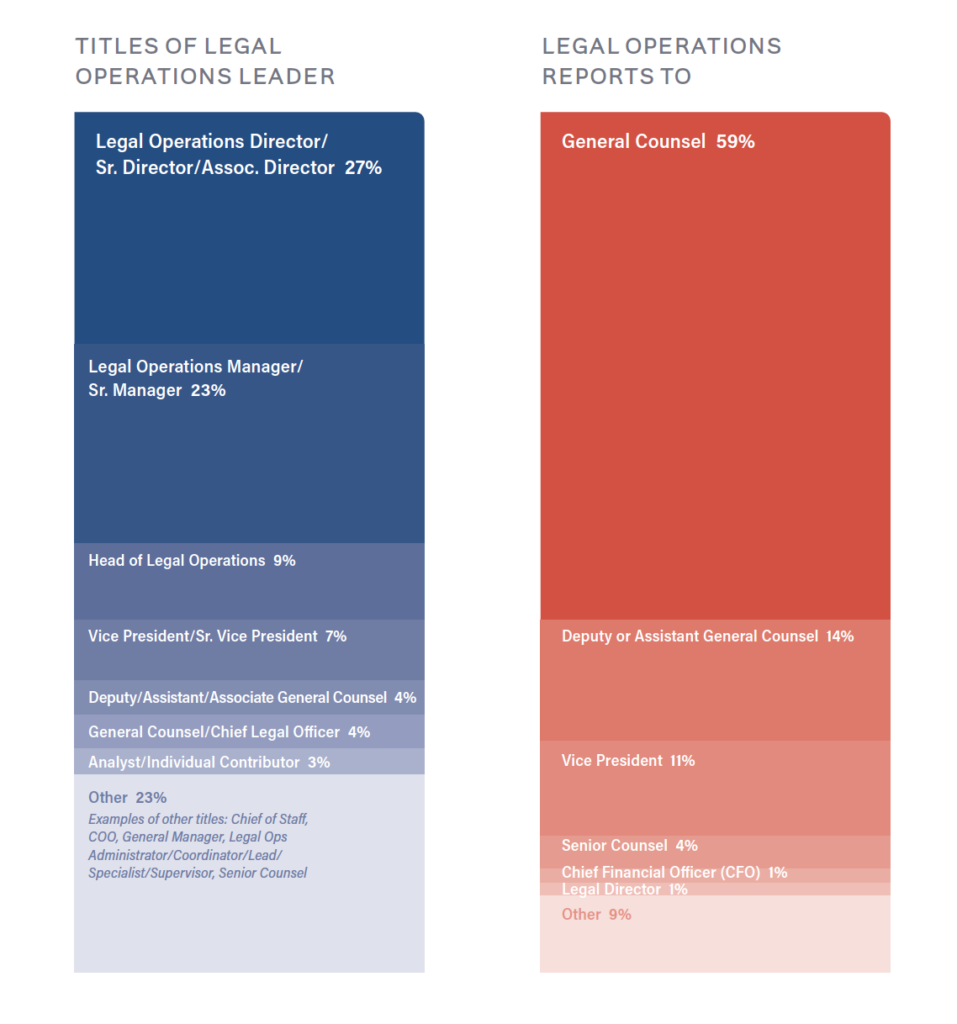
When it comes to the responsibilities of a legal operations professional, there’s no one-size-fits-all approach. After the first year in legal ops, our Legal Engineer & Compliance Manager Jenny shared her reflections:
Legal operations responsibilities will vary depending on the company. Every legal operations role is different, and may focus on different areas, like financial management, or the use of technology. For me, legal ops starts and ends with finding where legal is inefficient and handing over the solution or new process to the legal team. Those inefficiencies depend on their context.
Bookmark for later 👇🏼
Lessons from my first year in legal operations
Read more
How to be successful in legal operations management
Download the guide
Why you must digitalise your legal department – and how legal ops makes it less impossible than it seems
As our customer Damien Boutigny, General Counsel at NA-KD puts it,
"Legal departments must definitely embrace new technologies for gaining efficiency and increasing transparency. Having the right technology is key to supporting growth."
Status quo for legal departments: do more with less (you’re welcome!)
Regardless of which legal news outlet or legal research you follow, legal teams and legal leadership inside organisations are under lots of pressure to cut costs. Thomson Reuters’ recent report shows that managing costs is legal departments’ top priority.
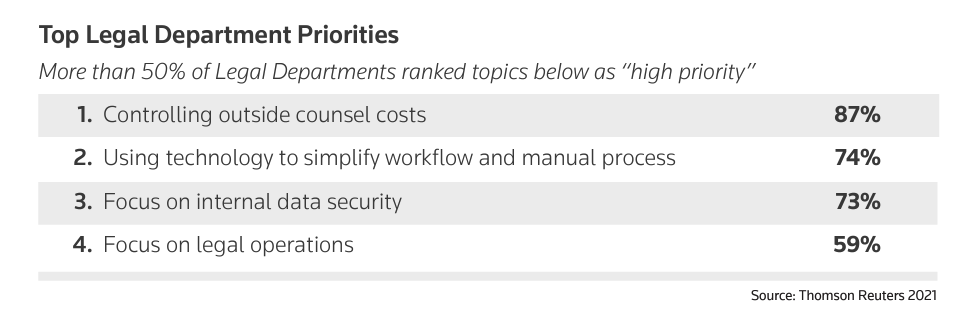
And let us not forget, the aim is to achieve those savings in parallel to legal teams actually experiencing an increase in their workload. Thomson Reuters 2021 State of Corporate Law Departments reports that 58% of law departments saw their workload surging since 2020.
In essence, legal teams are being asked to do a lot more with less, which means efficiency and automation is the only solution to this equation.
Legal operations technology: the only way forward
Although the covid years have taken a toll on many companies’ profitability they also planted a seed that more output can be achieved with less effort using the right technology. In the 2021 Law Departments Operations (LDO) Survey, 72% of respondents say that covid accelerated the automation/digital transformation within their organisation and more than a quarter say it sped it up substantially.
Technology plays a natural leading role here as it is the cornerstone of digital transformation but also imperative to saving costs.
“59% of General Counsel believe technology offers significant or very significant potential for cost savings, far ahead of any other opportunities” – EY General Counsel Imperative Series.
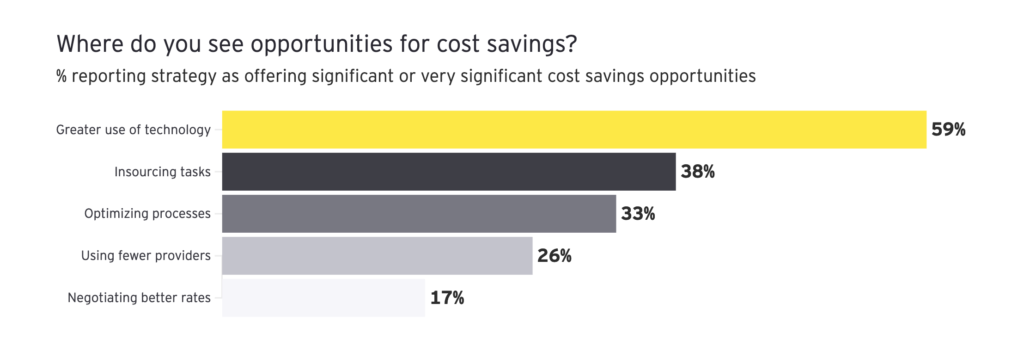
This can also be seen in the recent increase in legal tech budgets, initiatives and spend.
Gartner reports that legal tech spend will increase 3x from 2020 to 2025 and Thomson Reuters 2021 State of Legal Departments survey states that there is both a 52% increase in the use of legal technology as well as a 34% increase in technology spend 2021 vs 2020.
3 X
increase in legal tech spend from 2020 to 2025
52 %
increase in the use of legal tech
34 %
increase in tech spend 2021 vs 2020
According to the survey results by CLOC mentioned earlier, eSignature, eBilling, Contract Management Solution, and Document Management remain the top four technology areas more widely used in legal departments.
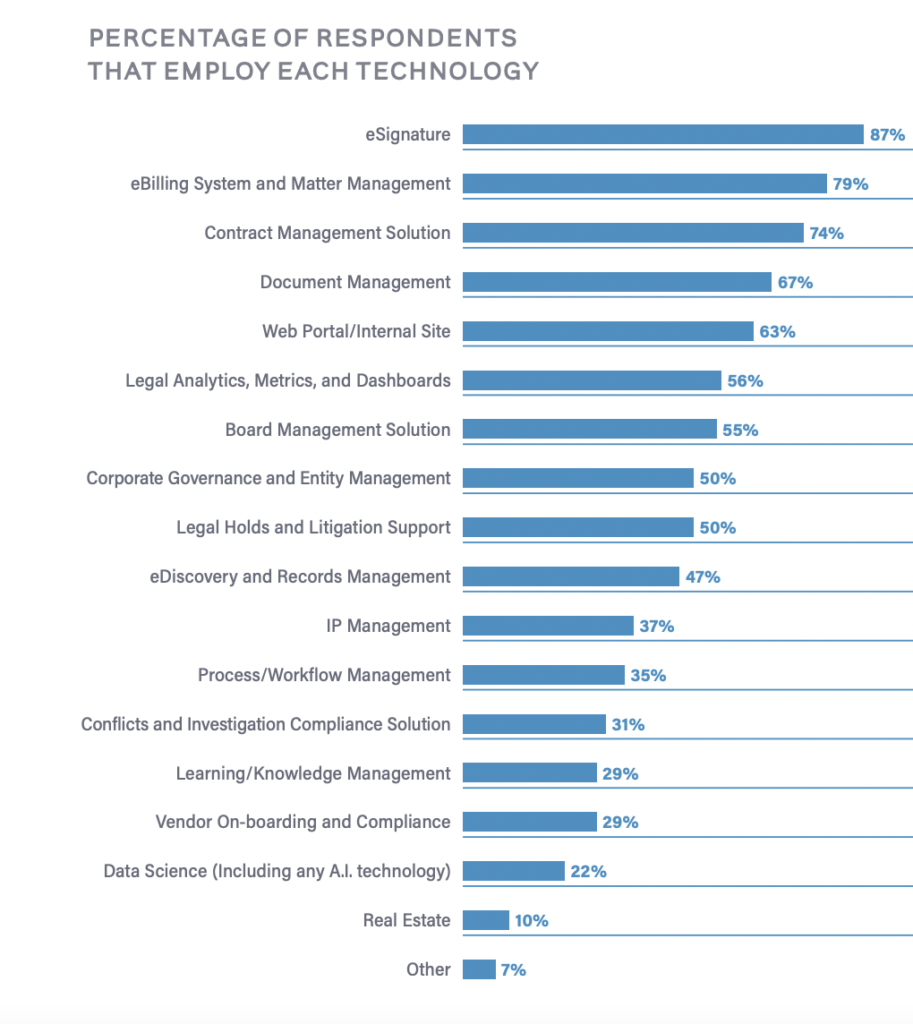
The benefits of digitalising and legal technology
Why is everyone convinced about technology and digitalisation being so imperative? Well, there are many benefits, probably some that you may not even have considered. The most common is actually a misconception; that technology “will take our jobs”. Now, this is typically the first sceptical answer and one that is not unique to legal in any way.
Manufacturing, Marketing, Sales, IT, HR etc. have all gone before and embraced technology, so let’s just kill that argument. Technology is here to stay and here to help and you may need to acquire a few new skills to embrace it, but when you do, you are in for a treat.
Gartner surveyed close to 300 Legal leaders in 2021 and the consensus there was that between 50-60% of legal work within areas such as drafting, negotiation, and review could be automated and that organisations are less than halfway there.
Their prediction was that by 2024 “legal departments will have automated 50% of legal work related to major corporate transactions.”
The most commonly quoted benefit is therefore time and resources. If we look at legal technology more specifically it will be things like:
- Less time spent drafting contracts
- Faster turnaround / execution time for contracts
- Fewer / less senior people involved in the process
- Less need for outside resources
The WCC’s excellent Contracting benchmarking study shares some great data relating to this as they see that the top performers who have embraced digitalisation and are using technology to improve processes are 80% faster than the slowest cohort in relation to contracting.
And that gap is widening and widening fast. Between 2019 and 2021 there was almost a 20% increase in the gap between fastest and slowest performers, and even larger gap looking at the most complex cases.
But there are many other benefits too with technology and digitalisation:
- Reduction of errors
- Compliance
- Integrations with other systems
- Monitoring and analytics
In ACC’s 2022 Chief Legal Officers Survey, 56% of CLOs had actually implemented technology to successfully comply with data privacy regulations. And in perhaps more specific terms, EY and Harvard’s 2021 Contracting reports shares two sobering numbers that almost on their own merit the investment in technology:
71 %
of contracts are not monitored for deviations from standard terms
90 %
of contract professionals struggle to locate contracts in the first place
And maybe to come full circle here, in favour of technology, it is very important to note two more things technology brings. Firstly that technology is not deployed for high-value or unique tasks but for low-value repetitive tasks. EY’s 2021 General Counsel report describes this very well:
“Law department leaders report that one out of every five in-house counsel hours is currently spent on low-value, repetitive or routine tasks, with 87% confirming that their department spends too much time on these tasks. As a result, 47% report that increasing volumes of low-value work have adversely impacted employee morale.”
So albeit lawyers may be adverse to change, they really do not like the status quo of increasing workloads and increasing mundane tasks.
Secondly, technology is also an enabler. Let us exemplify with contract management, which is a pain point not only for legal departments and legal may not have sole decision-making authority. Frankly, they may only be required to play a small role in the hundreds or thousands of sales-, lease-, supply chain and other agreements and negotiations in an organisation. And as Deloitte noted in their 2021 State of Legal Operations Survey “technology can add value to managing this process”.
Contracting – the catalyst for change
So then the challenge appears to be clear, and benefits aplenty. But let us be a bit more pragmatic here and look at where and how this change is likely to take place. There are certain things that always end up in the crosshairs of cost-cutting exercises. Usually, the third party spend or in the case of legal; outside counsel and advisors.
That may well be straightforward from a cost-cutting point of view, but your outside resources perform tasks that would then need to be performed in-house.
The other angle of this, which is echoed by all the research and numbers highlighted above, is to improve processes already mastered by the legal team. Naturally, you should start with the task that takes up the most time and is only done in-house; contracting!
This is why investment in contracting technology is number one on the list of technologies legal departments want to invest in. The 2021 ACC Law Department report has contract management as both the first priority as well as the area receiving the most investment.
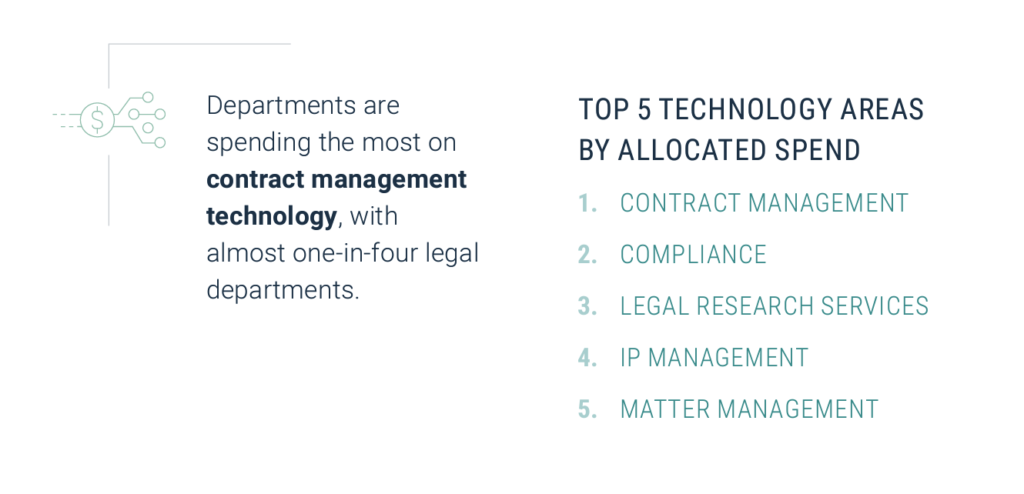
The 2022 ACC Chief Legal Officer Survey says that 70% of CLOs investing in tech are looking to invest in contract management and the 2021 Law Department Operations Survey from Blickstein Group says that 35% of legal departments are looking to invest in contracting technology in the next 12 months.
So any Chief Legal Officer or General Counsel would be hard-pressed to find a better technology investment opportunity than a contracting platform;
- Automate work that is repetitive
- Automate the type of work that takes up the majority of the legal team’s time
- Automate work done mainly in-house so hard to outsource
- Reduce costly errors by minimising human mistakes
The contracting problem
The Global Legal Department Benchmarking Survey – KMPG International (2021) confirms that the contracting struggle is real.
“A central finding from the survey is that we still have a problem with contracts; we have a problem with creating them and we have a problem with managing them. Looking at where legal teams spend their time, ‘contracting’ and ‘contract law’ (including general terms and conditions) is by far the largest drain at a whopping 22.3 per cent of resource.”
If the problem sounds relatable, watch this video podcast episode to find out how the legal team at Adverity structured their contract management and why 52% of customer & partner contracts at Adverity need no legal input. The recording will shed some light on how automating contract management can help legal teams focus on meaningful tasks instead of only dealing with the neverending routine contracts.
In this episode, Dani Manfreda, Deputy Head of Legal & Compliance at Adverity walks through:
- A typical contract automation workflow of a fast-growing SaaS
- The biggest benefits the legal department at Adverity gets from automation
- The difference in how legal collaborates with other teams after introducing contract automation
Having a contract lifecycle management (CLM) solution is imperative for legal teams today: it centralises contracting and manages the workflow between the legal department and the rest of the corporation. It’s never been easier to handle requests, drafting, negotiation, review, tracking, and reminders–everything in one place.
A contracting platform, such as Precisely, replaces time-consuming legacy solutions with a consolidated, automated workflow. Anyone can create and manage compliant contracts – and they don’t need to be legal experts or techies to do it.
Have legal departments been given an impossible task?
Although the picture painted above is clear; deploy technology to cut costs and increase efficiency, real life rarely is as straightforward. Frankly what is being asked of legal departments is very tough:
- Excel in a skill (technology / digitalisation / automation) you have not mastered before
- Spend less net money
- Do more
- Do it quickly
Very few legal leaders feel confident that they can create a cohesive, long-term plan for digitalising the legal department, according to Gartner’s The Future of Legal.
EY has a couple of equally sobering observations as they report that 99% of organisations don’t have the data and technology needed to improve their contracting process and that 97% of GC’s struggle to secure investment from the C-Suite.
So before everyone assumes (and god forbid some desperate GC:s commit) that this is a quick fix, it really is not and it is very much about execution and “the how” and as well that little issue of securing budget. KPMG reports that albeit budgets are growing, many organisations still have no legal tech budget. In fact, their average budget (based on the 2021 survey) is below $250k and the same survey says that 61% of organisations still do not have a legal technology budget.
Technology maturity: let’s walk before we can run
Further on KPMG label technology adoption in legal as “remarkably low” in their 2021 Legal Benchmarking report. Highlighting that the only tools currently with over 50% adoption are communication tools and legal research tools. So the reality is that most organisations start from a basic level.
One of the main challenges is the lack of an overall technology strategy. Many follow market hype rather than focusing on their own needs and organisational structure. Remember that the technological vision has to be yours – it must apply to your context and needs.
Legal Operations: The knight(s) in shining armour
There is no need for the entire legal team to be tech-savvy. But the person leading the digitalisation of the legal department needs to understand the opportunities that technology offers. This person should be able to navigate the tech landscape – identifying and evaluating the available legal software best suited for your needs.
The most typical appointment here is the legal operations person and / or departments. It is one of the most fast-growing legal professions and departments out there and one that almost every organisation is looking to build or expand. Thomson Reuters reports that 81% of their respondents in their 2021 survey are hiring legal ops.
Although historically a more typical “big company” department, it is now no longer the case. In the 2022 ACC CLO report, 60% of legal departments say that they have at least one dedicated Legal Ops professional, with the average number being more than 4. This is also a 3X increase compared to 2015. For large corporates (3+ B$) the same number is 75%.
With legal ops in place, it is easier to drive digitalisation – and to do it properly from the start. A legal operations professional optimises the in-house legal department and implements new technology to improve processes.
Excellent statistics from the ACC 2022 study show that the first legal ops professionals are hired when the legal department reaches 7 people. And the legal ops professionals can really work wonders without being that many as the same study shows that only after the legal departments headcount is over 100 does the legal ops team grow above 5.
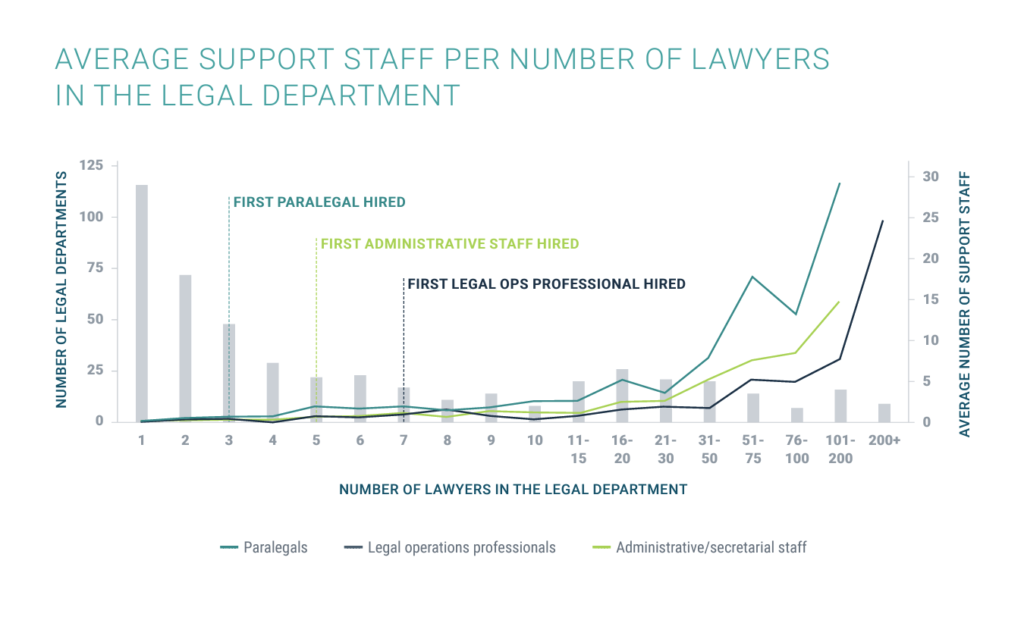
By having a function that is responsible for digitalisation, your legal team will be prepared to keep pace with the most significant trends that will impact the imminent future. It also ensures appropriate solutions for your needs, since legal ops knows both your business and the legal tech market.
And in addition to digitalisation, legal operations are also excellent stewards of cost management and budgets. Deloitte’s 2021 State of Legal Operations study even has the three most common legal ops Success KPIs being tied to spend. So you can see why in the ACC 2022 CLO report 70% of Chief Legal Officers listed legal operations as their department’s top strategic initiative.
How to get started on your digitalisation journey
Our checklist is a great starting point for creating legal ops and digitalising your legal department. In essence, it is about a three-step process: Audit, Plan, and Act.
Download our checklist and adjust it to your specific needs
Creating a digital roadmap
Download checklist The legal ops function will highly likely be transformational, so here are a few pointers regarding what to look for in hiring legal ops professionals.
Although every company has different needs, typically keep an eye out for a person who has:
- Engineering mindset
- Project management and leadership skills
- Legal understanding
- Communication skills
- UX mindset
- Visions for a more digital, streamlined, and business-oriented legal team
How to build the legal function in a scaleup
The scaleup phase is the most transformative stage of a company; it grows, moves, and changes quickly. As a legal professional, your duty is to ensure that legal keeps up with the pace of change while simultaneously building a solid foundation for the needs of tomorrow. So, how do you pull this off?
Working for a scaleup means you will get presented with lots of opportunities to learn new things and solve diverse challenges. It also often means that things are uncertain and that the pace is rapid. If you are among the first legal professionals to join the team, you will most likely be in charge of building up all legal operations from scratch.
To help you succeed, we will cover:
- Structuring the legal team in a scaleup
- Using digital tools to automate key legal processes
- Preparing for due diligence
- Securing external budget
Understanding the business, building relationships, and structuring a legal team takes time, but getting the basics in shape and keeping focus on the things that matter will pay off in the long term and ensure you have an excellent foundation to build on when your company continues to grow.
Structuring the legal team in a scaleup
Being the only legal professional in the organisation will result in a variety of tasks; everything that looks, tastes or smells like legal will be for you to handle. Be ready to become involved in a broad variety of things – it will be a thrilling experience where you can make a huge difference!
Before long, you will hopefully have the chance to build up and welcome new colleagues to the legal team. Scoping out the different roles and responsibilities today – already thinking six months, one year and three years ahead – will help shorten the process when you get the budget approved to hire.
As a part of this scoping, take a proper look at how processes are set up today; who does what and when, where you foresee bottlenecks, and what risks are involved in each step – dare to be critical and rethink the processes.
Questions to ask:
- Which stakeholders are involved in the contracting process today, and in what stages?
- Where do communication and collaboration take place (Word comments, phone, email, chat etc.)?
- What are the main bottlenecks, today and those that you foresee in the future as the company expands?
- Which areas of improvement would have the most impact, according to you but also to other stakeholders?
In the next step, pull up a blank page and draw out the process evaluating who would *actually* need to be involved, and when. This exercise gives you an opportunity to rethink the legal processes that might already exist at the same time as evaluating which roles you would want to fill and what expertise to look for.
As the person deciding what the legal team will look like and with the power to shape the workflows, you also have to ensure your work environment is sustainable and scalable. This means you need to quickly identify the right tools that will support your work, and the workflows you just put down on paper will pinpoint the functionality you need from a tool.
Looking for a benchmark for scaling legal operations and creating new–and oftentimes innovative–roles within the department? Take a look at the case of Adverity.
When Fiona Greiner, currently VP Legal & Compliance at Adverity, joined the company she was the first legal person onboard. The legal team had to scale fast to serve the hypergrowth phase. Today, Adverity is a fast-growing B2B SaaS that recently closed $120M in Series D funding.
Curious to learn how Fiona created Adverty’s legal operations team from scratch and what roles the team came up with? Watch the recap of our chat with Fiona below. We touched upon:
- How Fiona approached creating roles and recruiting
- What KPIs Adverity’s Legal ops team has
- What value the team brings to the business
Using digital tools to automate key legal processes
One thing is certain: the processes, the team, and the workload are bound to stretch and expand. What will not change is the need to ensure compliance. That is why it is crucial to set a robust ground with scalable processes.
In a way you should be looking for ways to scale yourself: with the right tools and processes in place, you should be able to ensure legal never becomes a bottleneck for the organisation. In essence, this means you need to ensure that you can delegate while still keeping control.
Choosing the right tools for your legal tech ecosystem will facilitate your company’s continued growth. It also supports your colleagues in other teams in achieving their objectives faster. Reliable and efficient processes built around how the tools are used will become as crucial as the tools themselves in scaling the legal function, and in turn the whole business, sustainably.
Let’s take one of the most common bottlenecks as an example: contracts. Being efficient in your contract management is an essential part, and it highly benefits the overall business.
For instance, at a time in the company’s life where every signed contract matters, how can you ensure the sales team can close deals without you holding up a process? How much time would you save if you didn’t have to double check that discounts are within reason and that no costly commas have been added to calculations or clauses?
To not drown in repetitive and administrative tasks tied to contracts, automating your contract workflows is one example of being involved only when your competence is actually needed. That’s why more and more companies are thinking about legal operations and introducing legal technology to reduce bottlenecks and allow legal professionals to focus on what they do best.
Example workflow: managing employment contracts digitally
A scaleup hires frequently and employment contracts can easily become a bottleneck. With a CLM platform in place, you will have an automated template with pre-set approval workflows and logic behind it to make the contracting fast and smooth.
The hiring manager simply answers a prebuilt questionnaire – everything from start date and length of probation period, to salary, and other benefits – and is able to generate a fully compliant contract in a minute.
A sophisticated CML platform can automatically calculate and populate the fields showing for instance the combined compensation or the exact dates when the probation period is over. Depending on the rules you have defined in the contract template, the platform can route the contract to the appropriate person for review. An example of this could be a compensation level above a certain number going to the CEO for approval vs below said number going to the Head of the recruiting team.
The approver can then choose to suggest edits or, if all is well, simply approve. Once approved, the hiring manager can send the contract straight to the candidate for negotiation or, if terms are pre-negotiated, for signing.
The signed contract is then stored in the right folder in an AI-assisted archive that only the right people have access to. To not have to keep important events such as expirations or renewal dates in your head, on a post-it note or in a calendar invite, a CLM platform will also automatically remind you in advance of important milestones.
To sum up, the process can be depicted as this:
1. Create
2. Control
3. Sign
4. Archive
5. Monitor
Preparing for due diligence
One thing that you can count on during an expansive phase is the topic of due diligence. It will occur as the company does funding rounds or enters into new business transactions with other parties.
Regardless of the size of the company and its legal needs, order and compliance are vital, and the right digital tools are an essential part of creating said order. Having your legal technology stack integrated to your enterprise software, you can rest assured that all data is gathered in one place and the information is always accurate and up to date, even if not all related tasks are executed inside the legal tools themselves.

The easier it is to find your contracts, the better off you are. With all contracts assembled and organised in the centralised archive inside your CLM platform, you don’t need to spend time gathering information for investors. Thanks to metadata, reminders, and versioning, you can show that you know where your contracts are, what your vendors are doing, and what the costs are within those agreements.
With the right choices for digital tools made, and with a robust CLM platform in place, there is no need to fret when a DD comes into focus – you are already in control and have all things in place by default!
Securing external budget
During the scaleup phase, the company might focus more on expanding functions such as sales or development. The legal team might not always be the most prioritised when allocating resources.
In their 2021 Survey, EY concludes that 97% of General Counsels face challenges securing their budget as they fail to convince CEOs. Creating stakeholder buy-in is challenging, as it requires an investment case supported by data – an area which historically has been challenging for many legal functions.
To ensure you get the budget and signoff you require for your investments, it is important to build a strong business case for your stakeholders based on financial data and clear calculations. Showing a clear return on investment for every post that you put forward helps you get wider buy-in from your organisation.
Calculating the ROI for your investments can at times be tricky. When it comes to a CLM platform, we built an ROI calculator to help you get started. It gives you an overview of the value a CLM platform like Precisely provides long term, both quantitatively and qualitatively.
Get internal buy-in with confidence
Calculate ROI for digital contracting software
Access the calculator When presenting your calculations, one thing worth noting is that most investments do not only benefit the legal team, as the results and increased efficiency trickles down to the whole organisation. Investing in legal often means investing in the company.
How to find your scaleup’s perfect CLM fit?
With the right CLM in place, you will have vital backing and the best time to procure and implement one is right now. Your workload will not lessen, so your best bet is to find time for this project today.
You can rest assured that it is likely the perfect CLM solution for you if it;
- Makes business operations and decision-making faster
- Enables easier collaboration across the organisation and with external parties
- Harnesses your entire company in compliant contracting
- Scales your legal function
- Turns compliance duties easier and faster
- Becomes your single source of truth for your contract
- Standardises your contracting processes
- Eliminates manual work from contracting
Working in an enterprise-level organisation?
📘 Learn how and why to digitalise the contracting process in enterprise companies.
Over to you
What do you think of the future of legal operations management? What’s the outlook for the industry in the next 5 years in your opinion? Share your thoughts on Linkedin, Twitter or any social media platform of your choice. Remember to tag @precisely––we’re eager to see what you think.


